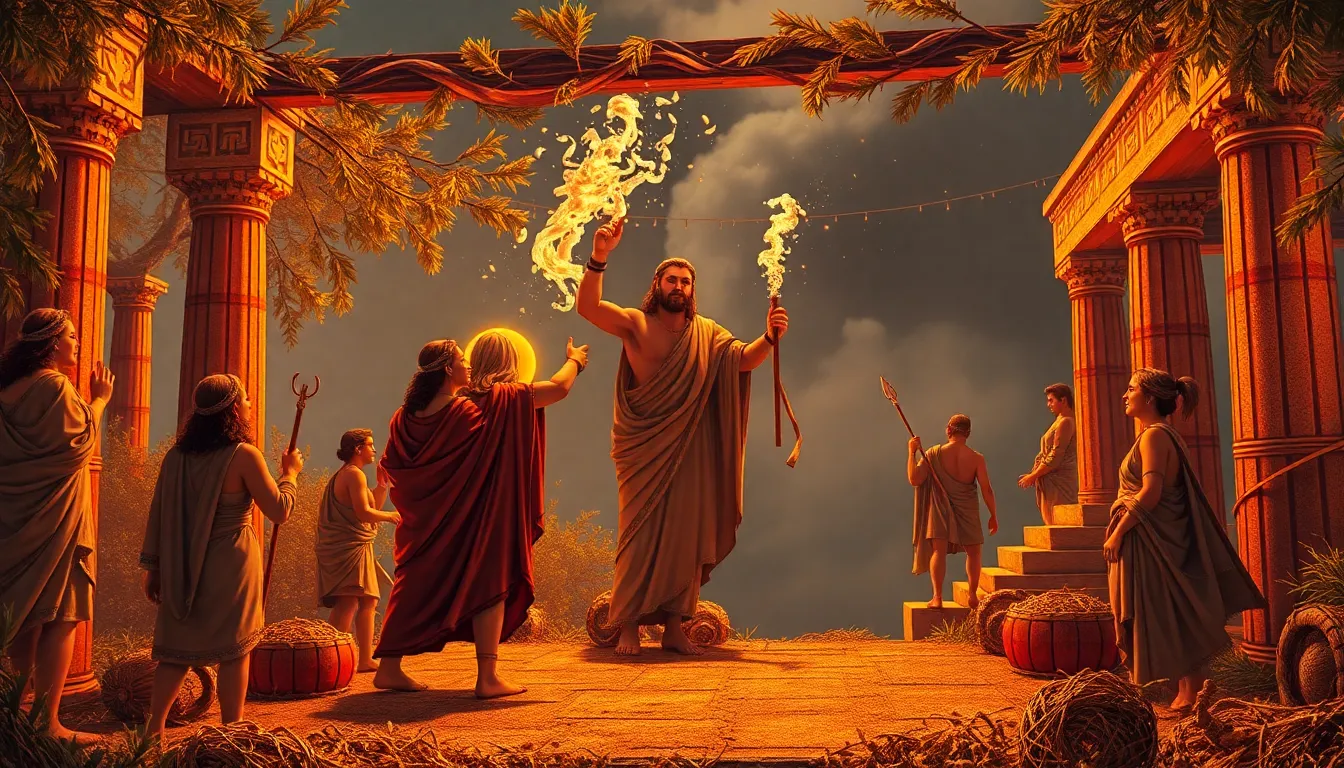The Festival of the Harvest: Celebrating Abundance in Ancient Greece
I. Introduction
Throughout history, harvest festivals have played a crucial role in agricultural societies, serving as a time of gratitude and celebration for the bounty of the land. Ancient Greece, with its rich agricultural heritage, celebrated the Festival of the Harvest, a significant event that honored the gods and marked the culmination of the farming season.
This article aims to explore the Festival of the Harvest in ancient Greece, delving into its historical context, rituals, social significance, and lasting legacy in contemporary culture.
II. Historical Context of Agriculture in Ancient Greece
Agriculture was the backbone of Greek society and economy. The majority of the population engaged in farming, and the success of crops directly influenced the well-being of communities.
A. Importance of agriculture to Greek society and economy
- Agriculture provided sustenance and livelihood for the majority.
- Crops were traded, contributing to the economy and interactions with other cultures.
- The agrarian lifestyle shaped social structures and community life.
B. Types of crops cultivated and their significance
The Greeks cultivated a variety of crops, including:
- Wheat: A staple food, essential for making bread.
- Barley: Used for food and brewing beer.
- Olives: Critical for oil production, a major trade item.
- Grapes: Important for winemaking and cultural rituals.
C. The role of seasonal cycles in agricultural practices
The agricultural calendar dictated the rhythms of life in ancient Greece. Seasonal cycles determined when to plant, tend, and harvest crops, with festivals aligning with these critical agricultural milestones.
III. The Festival of Demeter and Persephone
At the heart of the Festival of the Harvest was the myth of Demeter and Persephone, which symbolized the cyclical nature of life and death, growth and decay.
A. Overview of the myth of Demeter and Persephone
Demeter, the goddess of agriculture, mourned for her daughter Persephone, who was abducted by Hades. Her grief caused the earth to wither, leading to the first winter. When Persephone returned, spring brought forth new life, reflecting the connection between the divine and agricultural cycles.
B. The connection between the myth and the harvest festival
The festival celebrated the reunion of Demeter and Persephone, marking the end of the harvest season when the earth was most fruitful. It symbolized hope and renewal, emphasizing the importance of agriculture in sustaining life.
C. Rituals and celebrations dedicated to the goddesses
Festivities included offerings of first fruits, prayers, and communal meals, all intended to honor the goddesses and ensure future prosperity.
IV. Key Rituals and Practices During the Festival
A. Description of traditional rituals performed
During the Festival of the Harvest, various rituals took place, including:
- Processions to temples dedicated to Demeter and Persephone.
- Rituals of purification involving water and sacred items.
B. Offerings and sacrifices made to the gods
Participants offered:
- Grain and bread made from the season’s harvest.
- Livestock sacrifices to seek blessings from the deities.
C. Community gatherings and feasting
Festivals were marked by communal feasting, where community members shared food, drink, and stories, reinforcing social bonds and collective identity.
V. The Role of Music and Dance in the Festival
A. Importance of music and dance in ancient Greek culture
Music and dance were integral to ancient Greek society, considered essential for honoring the gods and enhancing communal experiences.
B. Types of musical performances during the festival
Performances included:
- Choral singing, often accompanied by lyres and flutes.
- Instrumental music that set the mood for rituals.
C. Dance rituals and their significance in celebrating abundance
Dancing was a physical expression of joy and gratitude, often representing the cycles of life, fertility, and the bond between humans and the divine.
VI. The Social and Economic Impact of the Festival
A. Strengthening community bonds through collective celebration
The Festival of the Harvest fostered a sense of belonging and unity among community members, encouraging collaboration and mutual support.
B. Economic implications for local farmers and merchants
Farmers showcased their produce, leading to trade and economic stimulation. Local merchants benefited from increased sales during the festivities.
C. Social hierarchies and roles during the festival
The festival also highlighted social hierarchies, with different roles assigned to various community members, from priests to farmers, each contributing to the sacredness of the event.
VII. Legacy of the Harvest Festival in Modern Greece
A. Continuation of harvest celebrations in contemporary Greek culture
Today, modern Greece still celebrates harvest festivals, reflecting the enduring agricultural traditions rooted in ancient practices.
B. Influence on modern agricultural practices and festivals
These celebrations often incorporate local customs and showcase the importance of community and sustainability in agriculture.
C. Preservation of ancient traditions in modern society
Many rituals and practices from ancient times have been preserved and adapted, connecting contemporary Greeks to their rich cultural heritage.
VIII. Conclusion
The Festival of the Harvest in ancient Greece was not merely a celebration of agricultural success; it was a profound expression of gratitude, community, and connection with the divine. Through rituals, music, and feasting, ancient Greeks honored the cycles of nature and the deities that governed them.
Today, as modern societies continue to celebrate abundance and uphold agricultural traditions, the legacy of the ancient Greek harvest festival endures, reminding us of our deep-rooted connection to the earth and the importance of community. The celebration of abundance, both in ancient and modern contexts, remains a vital aspect of human experience.




